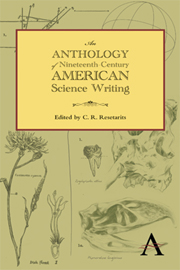Book contents
- Frontmatter
- Contents
- Preface
- Part One 1800–1846 Naturals and Naturalists
- Part Two 1846–1876 Warriors
- Part Three 1876–1900 Scientists
- Part Three Introduction
- “The Fixation of Belief” (excerpt), Popular Science Monthly (1877)
- “How to Make Our Ideas Clear” (excerpt) Popular Science Monthly (1878)
- “Catastrophism and Evolution” (excerpt), The American Naturalist (1877)
- “The Spectrum of an Argand Burner,” Science (1883)
- “The New Astronomy. I. Spots on the Sun” (excerpt), The Century (1885)
- “Screw,” Encyclopedia Britannica, vol. 21, 9th edition (1875–1889)
- “On the Relative Motion of the Earth and the Luminiferous Ether,” American Journal of Science (1887)
- “The Lake as a Microcosm” (excerpt), Bulletin of the Peoria Scientific Association (1887)
- “Laws of Temperature Control of the Geographic Distribution of Terrestrial Animals and Plants,” National Geographic Magazine (1894)
- “The Ecological Relations of the Vegetation on the Sand Dunes of Lake Michigan” (excerpt), Botanical Gazette (1899)
- “On the Equilibrium of Heterogeneous Substances, abstract,” American Journal of Science and Arts (1878)
- Bibliography
“The Lake as a Microcosm” (excerpt), Bulletin of the Peoria Scientific Association (1887)
from Part Three - 1876–1900 Scientists
Published online by Cambridge University Press: 05 June 2012
- Frontmatter
- Contents
- Preface
- Part One 1800–1846 Naturals and Naturalists
- Part Two 1846–1876 Warriors
- Part Three 1876–1900 Scientists
- Part Three Introduction
- “The Fixation of Belief” (excerpt), Popular Science Monthly (1877)
- “How to Make Our Ideas Clear” (excerpt) Popular Science Monthly (1878)
- “Catastrophism and Evolution” (excerpt), The American Naturalist (1877)
- “The Spectrum of an Argand Burner,” Science (1883)
- “The New Astronomy. I. Spots on the Sun” (excerpt), The Century (1885)
- “Screw,” Encyclopedia Britannica, vol. 21, 9th edition (1875–1889)
- “On the Relative Motion of the Earth and the Luminiferous Ether,” American Journal of Science (1887)
- “The Lake as a Microcosm” (excerpt), Bulletin of the Peoria Scientific Association (1887)
- “Laws of Temperature Control of the Geographic Distribution of Terrestrial Animals and Plants,” National Geographic Magazine (1894)
- “The Ecological Relations of the Vegetation on the Sand Dunes of Lake Michigan” (excerpt), Botanical Gazette (1899)
- “On the Equilibrium of Heterogeneous Substances, abstract,” American Journal of Science and Arts (1878)
- Bibliography
Summary
A lake is to the naturalist a chapter out of the history of a primeval time, for the conditions of life there are primitive, the forms of life are, as a whole, relatively low and ancient, and the system of organic interactions by which they influence and control each other has remained substantially unchanged from a remote geological period.
The animals of such a body of water are, as a whole, remarkably isolated – closely related among themselves in all their interests, but so far independent of the land about them that if every terrestrial animal were suddenly annihilated, it would doubtless be long before the general multitude of the inhabitants of the lake would feel the effects of this event in any important way. One finds in a single body of water a far more complete and independent equilibrium of organic life and activity than on any equal body of land. It is an islet of older, lower life in the midst of the higher more recent life of the surrounding region. It forms a little world within itself – a microcosm within which all the elemental forces are at work and the play of life goes on in full, but on so small a scale as to bring it easily within the mental grasp.
Nowhere can one see more clearly illustrated what may be called the sensibility of such an organic complex, expressed by the fact that whatever affects any species belonging to it, must speedily have its influence of some sort upon the whole assemblage.
- Type
- Chapter
- Information
- An Anthology of Nineteenth-Century American Science Writing , pp. 255 - 266Publisher: Anthem PressPrint publication year: 2012
- 1
- Cited by



